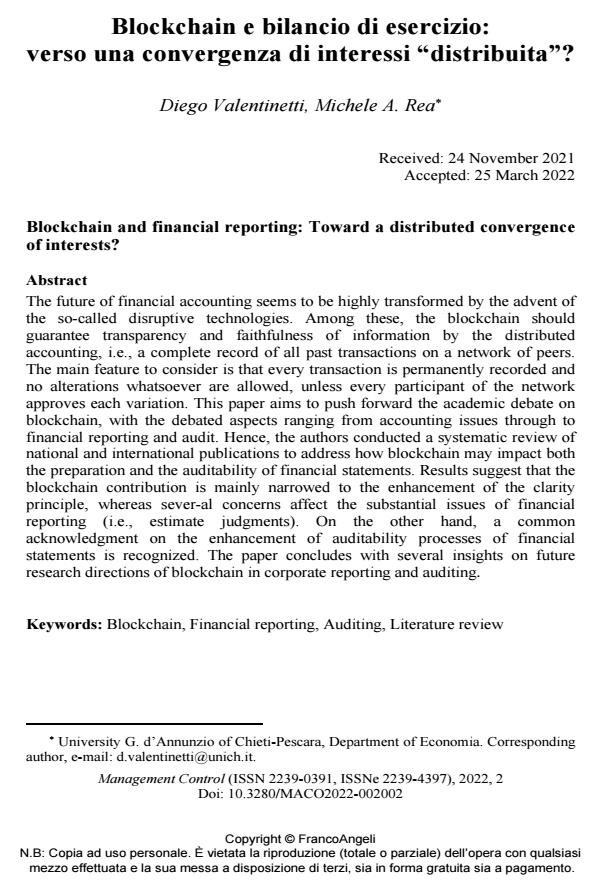Blockchain e bilancio di esercizio: verso una convergenza di interessi "distribuita"?
Titolo Rivista MANAGEMENT CONTROL
Autori/Curatori Diego Valentinetti, Michele A. Rea
Anno di pubblicazione 2022 Fascicolo 2022/2
Lingua Italiano Numero pagine 26 P. 15-40 Dimensione file 326 KB
DOI 10.3280/MACO2022-002002
Il DOI è il codice a barre della proprietà intellettuale: per saperne di più
clicca qui
Qui sotto puoi vedere in anteprima la prima pagina di questo articolo.
Se questo articolo ti interessa, lo puoi acquistare (e scaricare in formato pdf) seguendo le facili indicazioni per acquistare il download credit. Acquista Download Credits per scaricare questo Articolo in formato PDF

FrancoAngeli è membro della Publishers International Linking Association, Inc (PILA), associazione indipendente e non profit per facilitare (attraverso i servizi tecnologici implementati da CrossRef.org) l’accesso degli studiosi ai contenuti digitali nelle pubblicazioni professionali e scientifiche.
The future of financial accounting seems to be highly transformed by the advent of the so-called disruptive technologies. Among these, the blockchain should guarantee transparency and faithfulness of information by the distributed accounting, i.e., a complete record of all past transactions on a network of peers. The main feature to consider is that every transaction is permanently recorded and no alterations whatsoever are allowed, unless every participant of the network approves each variation. This paper aims to push forward the academic debate on blockchain, with the debated aspects ranging from accounting issues through to financial reporting and audit. Hence, the authors conducted a systematic review of national and international publications to address how blockchain may impact both the preparation and the auditability of financial statements. Results suggest that the blockchain contribution is mainly narrowed to the enhancement of the clarity principle, whereas sever-al concerns affect the substantial issues of financial reporting (i.e., estimate judgments). On the other hand, a common acknowledgment on the enhancement of auditability processes of financial statements is recognized. The paper concludes with several insights on future research directions of blockchain in corporate reporting and auditing.
Parole chiave:Blockchain, Financial reporting, Auditing, Literature review
- Blockchain implications for the accounting realm: A critique of extant studies Rosanna Spanò, Maurizio Massaro, Adele Caldarelli, Carlo Bagnoli, in MANAGEMENT CONTROL 1/2023 pp.21
DOI: 10.3280/MACO2023-001002 - Management control in inter-firm relationships: Opportunities and challenges of blockchain technology adoption Giovanna Centorrino, Guido Noto, Daniela Rupo, in MANAGEMENT CONTROL 3/2022 pp.65
DOI: 10.3280/MACO2022-003004
Diego Valentinetti, Michele A. Rea, Blockchain e bilancio di esercizio: verso una convergenza di interessi "distribuita"? in "MANAGEMENT CONTROL" 2/2022, pp 15-40, DOI: 10.3280/MACO2022-002002